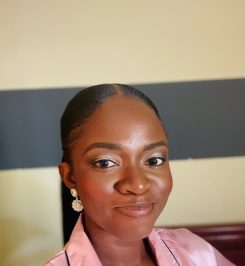Q&A with Araba Oduro, MPH student in Global Health
What was your background prior to enrolling in the MPH program at Gillings?

Araba Oduro
Prior to coming here for my MPH, I completed my degree in medicine (Bachelor of Medicine and Bachelor of Surgery) in Ghana. I worked for about four years as a medical doctor within the pediatric unit of a regional hospital in Ghana. I saw pediatric patients and also supervised new doctor interns who joined the department. I planned the interns’ schedules and organized clinical meetings, events, and presentations.
I was also part of the quality improvement team within the department. We started one project, Operation Zero Mortality or Operation “Z mort”, to help reduce the number of preventable deaths in the under-five population. This was a five-year project; when I left we were in the second or third year. We looked at the social determinants of health and other hospital-related factors that were causing preventable deaths. We formed a committee and, using quality improvement tools, we identified the factors that were contributing to preventable deaths. Some of the issues were related to a lack of awareness about pediatric conditions. In many families, socioeconomic issues have to be prioritized, and if a child was ill the caregivers would first go to the pharmacy for medication rather than take the child to the hospital to avoid missing work. Parents would wait thinking the medication would work, and the duration between the onset of illness and the child arriving at the hospital was a problem. The first part of our project included health education and health promotion efforts. Doctors and nurses volunteered to present on radio stations to educate caregivers about how to identify health danger signs. We also emphasized the need to bring children to the hospital immediately with any danger signs (fever, cough, anything if you’re not sure).
We had other ongoing projects in the hospital like the Making Every Baby Count (MEBCI) project where I was one of the coaches. I trained other health workers in my department in newborn care. All these events helped me decide to pursue an MPH. I was interested in looking at prevention rather than just management and treatment of illnesses. I also wanted to be able to advocate for certain resources within the hospital (as some factors we identified that contributed to preventable deaths were due to hospital setting), including certain pieces of equipment and education being available. During that period, we were able to have a separate pediatric emergency unit with major support from international organizations. My head of department was the pioneer for the project – she advocated for project resources and was a great mentor.
What has been your favorite class so far and why?
I’ve enjoyed most of my classes, so it’s hard to pick a favorite. There are bits and pieces of various classes that I’ve enjoyed. In Cultural Humility I’m getting to know my positionality (my heritage, life, experiences) and understand how cultural humility comes into research and public health interventions. In Systems Thinking in Public Health Issues, I’m learning how to use various systems tools to identify public health issues. I feel as though all the classes are linked – Data Analysis comes in because we analyze data critically and Methods and Measures has helped me understand the literature more (i.e. understanding ratios and rates). Critical Issues in Global Health is a good class because we get to meet and hear from people working in the field. A lot of the speakers have inspired me, and I’ve gained interest in WASH after Dr. Musa Manga’s lecture.
What are some of your research interests in global health?
I know some people can zone in and have a single interest, but my interests are broad. I’m largely interested in maternal and child health as well as adolescent health. I’m also interested in WASH and nutrition, health systems strengthening, and community-based participatory research.
Can you tell us about your role as a Graduate Research Assistant with the Department of Maternal and Child Health?
I’m working under the supervision of Dr. Ilene Speizer who is a professor in the Maternal and Child Health department. In her research in family planning, we’re working on a systematic review of person-centered measurement in family planning. The basis of this review is that most key performance indicators (KPIs) or measurements in family planning are not person-centered; they just measure unmet need or met need and don’t take into consideration decision-making or autonomy of those who are involved. The rationale for this study is to come up with person-centered key indicators within measurements in family planning. I’ve been doing literature reviews, and my courses this semester have helped me with this work as well.
When not studying or working, how do you like to spend your free time?
Most of the time when I’m not studying or working I’m probably watching a series on Netflix. I like to watch anime, sitcoms, or action movies. I like baking though I haven’t had much of an opportunity to do that here yet. I also like exploring my own style of the foods that we have back home and experimenting with recipes. Being here, most of the time my focus is on school and assignments – but one thing I’d like to do more of is go to new places, discover more cuisines, and make new friends.
What is the best piece of advice someone has shared with you?
This is a summary of some advice I’ve received from family and friends: Believe in yourself! Sometimes you think you are not enough or that you don’t have the skills or expertise or knowledge to be where you are – but you have enough! Whoever you are and are becoming is enough to get you where you want to be and to achieve what you want to achieve. Just have faith, believe in God, and push through your circumstances.
